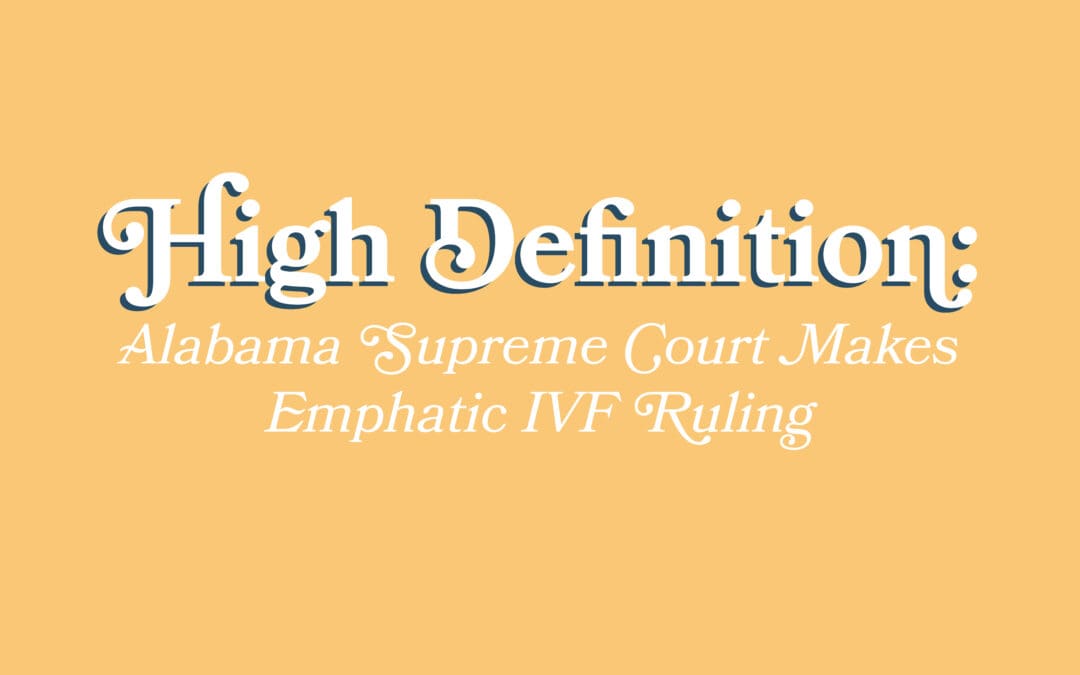Unborn children are children. Period. It doesn’t matter if they are housed in a womb, or in a cryogenic nursery through in vitro fertilization.
Such was the tenor of the 8-1 decision rendered by the Alabama Supreme Court on February 16. The plaintiffs in the case, parents who lost embryos due to the negligence of a fertility clinic, appealed to Alabama’s highest court after they were denied in a lower court.
The lower court ruled that the embryos did not meet the definition of a person or child, and were only considered “property.” The wrongful death claim was denied, but the fertility clinic was found guilty of a lesser charge of breach of contract.
The clinic’s negligence occurred in December 2020. According to court records, “A patient at an Alabama hospital wandered into the fertility clinic through an unsecured doorway. The patient then entered the cryogenic nursery and removed several embryos. The subzero temperatures at which the embryos had been stored freeze-burned the patient’s hand, causing the patient to drop the embryos on the floor, killing them.”
In the Alabama Supreme Court case, the defendants argued that an unborn child ceased to qualify as a “child” or “person” if that child was not contained within a biological womb. The court disagreed, ruling that the state’s Wrongful Death of a Minor Act “applies on its face to all unborn children, without limitation.”
“Neither the text of the Wrongful Death of a Minor Act nor this court’s precedents exclude extrauterine children from the Acts coverage. Unborn children are children under the act, without exception based on developmental stage, physical location, or any other ancillary characteristics.”
Additionally, the Alabama Constitution endorses the concept that unborn children are, indeed, entitled to legal rights.
Albert Mohler, president of the Southern Baptist Theological Seminary, called the court’s reasoning “unassailable.”
“It is objectively true that a human embryo is a human person, bearing human dignity, made in the image of God,” Mohler said on his podcast, The Briefing. “A human embryo is a human being, wherever that embryo may be found.”
For the last 20 years, Mohler has spoken out against IVF, challenging the evangelical community to consider the fate of frozen embryos that never get implanted (or eventually destroyed) as a sanctity of life issue.
“The Alabama State Supreme Court has really thought through this issue,” Mohler said. “It has done so in a way that is likely not only to prompt a lot of conversation, [but will hopefully] prompt a lot of moral thinking, even as a prompt to conscience among American evangelicals.”
As a result of this ruling, at least three Alabama IVF providers have halted treatments according to news reports, citing concerns over potential civil and criminal liabilities. Some critics say the decision casts doubt on future access to IVF procedures in the state, impacting many families and individuals seeking fertility treatments.
However, a March 5 article in World Magazine, “IVF clinics, patients, lawmakers misunderstand Alabama ruling,” sought to bring clarity to the situation.
“Alabama Attorney General Steve Marshall had already clarified that he does not intend to use the ruling as a basis to prosecute IVF doctors or families who use their services,” wrote Leah Savas.
The article also quoted pro-life attorney Sam McLure, who has worked on embryo adoption cases. McLure said the decision itself is clear that it does not affect the state’s criminal homicide laws: “That’s not asserted anywhere, even in the dissenting opinion. This opinion is really very narrow…”
In response to the potential impacts of this ruling, ongoing legislative activity within Alabama is aimed at clarifying the legal status of frozen embryos and ensuring the continuation of IVF services while protecting embryos.
In its decision, the Alabama Supreme Court referred to Webster’s Dictionary in affirming its definition of embryos as children.
“This Court’s most-cited dictionary defines child as ‘an unborn or recently born person,'” the decision stated. “And all other mainstream dictionaries are in accord – The Oxford English Dictionary [defines] child as an ‘unborn or newly born human being – Webster’s Third New International Dictionary [defines] child as ‘an unborn or recently born human being.'”
“There is simply no patent or latent ambiguity in the word child.”

